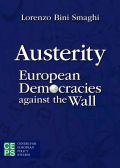Puntscher, S., Wydraa, D., (2013), “Representation in the European State of Emergency: Parliaments against Governments?”, Journal of European Integration, Vol. 35, Issue 5, pp. 565-582. If governments allow themselves to be entirely bound to the decisions of their parliament, without protecting their own freedom to act, a break up of Europe would be a more probable outcome than deeper integration.’ The statement of the Italian Prime Minister and head of …Read More
Representation Deficits and Surpluses in EU Policy-making
Bellamy, R., Kröger, S., (2013), “Representation Deficits and Surpluses in EU Policy-making”, Journal of European Integration, Vol. 35, Issue 5, pp.477-497. Representation and democracy are not always complementary. Sometimes the one undermines the other. Too much democracy can create a representation deficit, as occurs when majorities oppress or neglect minorities. However, the opposite can also arise. The over representation of different groups can undermine the processes whereby representatives are authorised …Read More
Whose economic reform?
Pisani-Ferry, J., (2013), “Whose economic reform?”, www.project-syndicate.org, 30 Ιουλίου. Together with fiscal consolidation, structural reform is the new European mantra. International organizations and European Union bodies regard such reform as a prerequisite of economic recovery, growth, and alleviation of the unemployment plague.
Austerity: European democracies against the wall
Lorenzo Bini Smaghi, (2013), Austerity: European democracies against the wall, CEPS. The crisis in the eurozone has had a dramatic impact on the economic and social fabric of European countries. However important it may be, the economic dimension is only the symptom of a broader problem. The crisis is primarily political in nature. Lorenzo Bini Smaghi argues in this book that the crisis reflects the inability of western democracies to …Read More
Saving the Euro at the Cost of Democracy
Crum. Ben, (2013), “Saving the Euro at the Cost of Democracy”, Journal of Common Market Studies, Vol. 51, Issue 4, July 2013, p.p. 614-630 This article explores the implications of the financial crisis for the relationship between monetary integration and democratic government in the European Union (EU). As the crisis has exposed the original balance that economic and monetary union (EMU) sought to maintain between monetary integration and policy diversity …Read More
Portugal’s Political Crisis
Kirkegaard Funk, Jacob, (2013), “Portugal’s Political Crisis”, www.piie.com, 3 Ιουλίου. A political crisis has suddenly erupted in Portugal, spurred by deep divisions in the government of Prime Minister Pedro Passos Coelho, aggravated by years of austerity and bleak economic forecasts. The political turmoil has rattled financial markets and raised doubts about Portugal’s ability to recover from its long slump.Yet deteriorating economic fundamentals in Portugal did not cause this crisis. Political …Read More
High Level Group on Modernisation of Higher Education
European Commission, (2013), High Level Group on Modernisation of Higher Education, Ιούνιος 2013. The EU high-level group on modernisation of higher education publishes its first report today on improving the quality of teaching and learning in universities. The group, chaired by former President of Ireland Mary McAleese, makes 16 recommendations (see Annex 1) which include a call for mandatory certified training for professors and other higher education teaching staff, more …Read More
We Need a New Grand Bargain in Europe
Tsoukalis, Loukas, (2013), “We Need a New Grand Bargain in Europe”, ΖΙΒ 01/2013, Ιούνιος. This article examines the linkages between economics and politics, markets and institutions during the most serious crisis that has hit Europe for decades. With the bursting of a big international financial bubble at its origin, it has exposed a systemic failure in the euro area coupled with different national failures. Many unthinkables have become reality since …Read More
Ευρωβαρόμετρο: 1 στους 2 νέους Έλληνες και Κυπρίους θα ψηφίσει στις Ευρωεκλογές του 2014 (upd)
Μιχαλόπουλος, Σαράντης, (2013), “Ευρωβαρόμετρο: 1 στους 2 νέους Έλληνες και Κυπρίους θα ψηφίσει στις Ευρωεκλογές του 2014 (upd)”, euractiv.gr, 27 Μαΐου. Σχεδόν τα 2/3 των νέων Ευρωπαίων προτίθενται να συμμετάσχουν στις επικείμενες Ευρωεκλογές του 2014, σύμφωνα με πρόσφατη έρευνα του Ευρωβαρομέτρου. Από τους Έλληνες νέους ωστόσο, μόλις ένας στους δύο δηλώνει ότι θα προσέλθει στις κάλπες τον επόμενο Μάιο.
Europe’s Troika Should Grow Up
Pisani-Ferry, Jean, (2013) “Europe’s Troika Should Grow Up”, www.project-syndicate.org, 27 Μαΐου 2013. In early 2010, a group of men (and a few women) in dark suits landed in Athens. They belonged to a global institution, the International Monetary Fund, and to a pair of regional ones, the European Commission and the European Central Bank. Their mission was to negotiate the terms and conditions of a financial bailout of Greece. A …Read More





